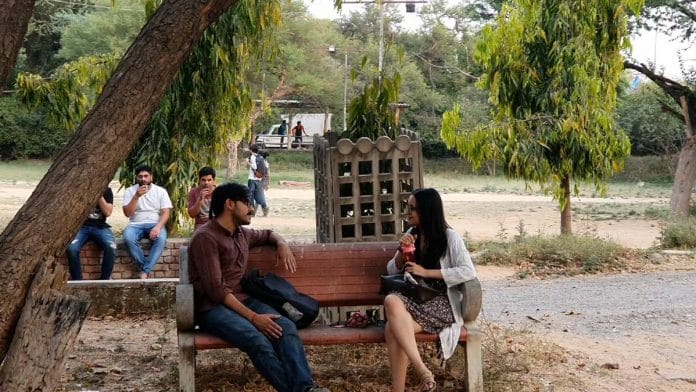New Delhi: At the gates of Jawaharlal Nehru University (JNU), at least 10 media cars have blocked all the parking space as reporters and camerapersons mill about. Once every few hours, one of them goes on air to give an update about the “tense” atmosphere on campus. With bandaged hands, students affiliated with the Akhil Bharatiya Vidyarthi Parishad (ABVP) go from reporter to reporter to offer their soundbites.
But despite the narrative of tension following Sunday evening’s violence between groups of students — allegedly over non-vegetarian food being served in a hostel mess on Ram Navami, or, according to the ABVP, over the disruption of a pooja — within the campus a day later, life goes on, but with a sense of alertness.
As the scorching heat abates and sundown approaches, students can be seen congregating at the many eateries on campus. In small groups, they sit and carry on with their reading or conversations, or grab their evening tea. A quick survey finds that students from Left- and Right-wing groups, as well as those who aren’t with any party, are all in the mix.
Walking by, a senior leader of the All India Students Association (AISA), affiliated with the Communist Party of India (Marxist-Leninist) Liberation, reveals during a conversation that he is on his way to submit an official complaint about the violence at the Vasant Kunj North Police Station. Casually, he adds, “You know, we are so many in number — imagine if we took to violence with these ABVP guys?”
At a table sits a Delhi University professor who has come to check on the place that he calls his alma mater. Wishing to remain anonymous, he says, “You know, I was a student here when the whole tukde-tukde incident happened. I wonder what politics is afoot this time.” The term ‘tukde-tukde gang’ was popularised as an insult for Left-leaning JNU students who protested in 2016 against the hanging of Kashmiri separatist Afzal Guru three years before.
According to sources in the administration, no formal permission was taken for the pooja conducted by the ABVP at Kaveri hostel.
Sense of unease
There is an acute sense of alertness among students. While some are busy giving media soundbites, others are making rounds to the hospital, where several injured students were taken.
Siddharth Jha, a student who joined the campus not more than six months ago says, “You know, we had always read about clashes between student groups in JNU, but this is the first time I witnessed it. I saw how one-sided the violence was. I saw the narrative being built in the media about a ‘clash’.”
The student, from the department of history, says he can now see how a violent image of JNU is being built over time, and how far this is from the truth.
Another student sitting far away doesn’t wish to be identified because she’s with the ABVP, but when asked about the general mood on campus, she responds, “Doesn’t everything look as it was? Nothing has changed. Everyone is going about their lives the way they did before.”
Police register cross FIRS
While there was a lull on campus, the Delhi Police Headquarters Monday saw a group of about 70 AISA students gathering to protest against the police’s alleged inaction the previous day. But just minutes after the protest began, all the students were detained, taken to police stations, and released over the course of the day.

While several students from AISA went to submit their complaint at the Vasant Kunj North police station, the ABVP had filed its own. The police have since registered cross FIRs against unknown persons affiliated with the ABVP as well as the JNU Students’ Union (JNUSU) and Left-wing groups.
The charges in the two FIRS include Indian Penal Code (IPC) sections 323 (punishment for voluntarily causing hurt), 341 (wrongful restraint) 509 (word, gesture or act intended to insult the modesty of a woman), 506 (criminal intimidation) and 34 (acts done by several persons in furtherance of common intention).
Also read: Delhi Police FIR in JNU violence blames ‘unknown people’, Left-Right slugfest continues






